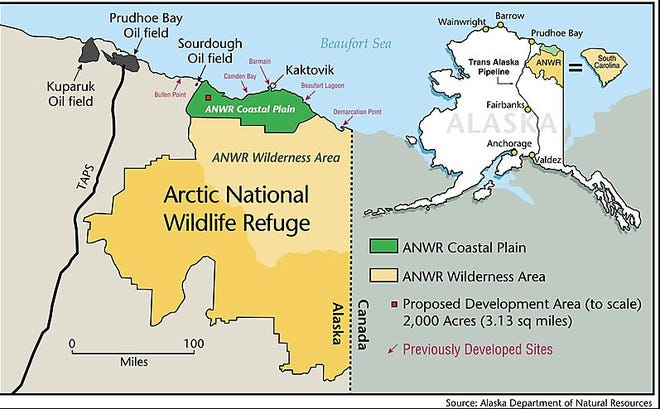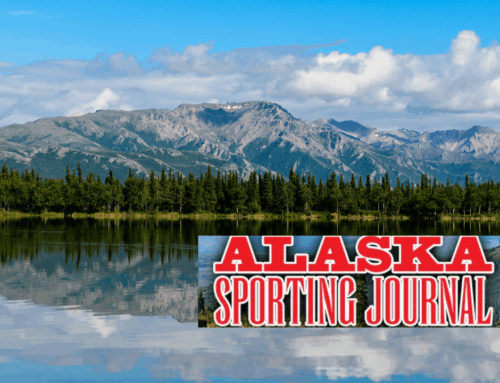Sometimes a story can help us understand an issue with more depth. I met with 12 Gwich’in people last week. They were telling me about their love for their pristine homeland in the Canadian National Parks of Ivvavik and Vuntut, in Yukon, Canada, and the Arctic National Wildlife Refuge in Alaska.
They are an ancient people who have been connected spiritually and physically to the Arctic National Wildlife Refuge for 20,000 years. They are a living portrait of what ancient hunter gatherers look like. Their major source of food is the Porcupine Caribou, which provides them with sustenance as well as clothing and other needed items.
The Arctic Refuge is home to polar bears, grizzly bears, and more than 200 species of birds. It contains more than 19 million acres of land considered sacred by the Gwich’in people. Established in 1960 to protect its extraordinary wildlife and wilderness, the Arctic Refuge is a place where natural processes remain mostly uninfluenced by humans.
For Alaska’s Gwich’in people, the Arctic Refuge is a critical part of both their community and their faith. Many Gwich’in are Episcopalians. The Gwich’in people rely on the Porcupine Caribou as a primary source of food and their very survival. More than 70 percent of their diet comes from caribou. For them, the caribou is more than food and clothing; it is literally and spiritually who they are.
After my meeting with the Gwich’in, a young man came up to me and showed me a photograph on his phone. He told me that in the foreground of the photo was his backyard. In the middle, he said, was a river. The beautiful land at the top of the photo, the man reported, is where the oil companies are going to drill for oil and gas. He told me that he was very sad thinking that his two boys were going to have to grow up so close to rigs that were going to extract oil and gas. I understood. I wouldn’t want my children and grandchildren living in the backyard of oil rigs.

In 2017, President Trump’s tax bill was supported by Congress and became the law of the land. It required that there be a sale of leases for drilling for oil and gas in the Arctic Refuge. In a study, the National Academy of Sciences concluded that oil development would harm wildlife and their habitats, especially the Porcupine Caribou herd in the Arctic Refuge. With the threat of oil development in their calving grounds, it is virtually certain that the size of the herd would be diminished, effectively ending the Gwich’in way of life.
The first sale of the leases was held in 2020. The next one will be in 2024. On Jan. 6, the Trump administration held the first lease sale for tracts on the 1.5 million-acre coastal plain of the Arctic Refuge, and the results were surprising. No major oil companies showed up to bid and only nine tracts were sold out of 22 offered. The sale generated only 1 percent of projected revenue, according to the government watchdog Taxpayers for Common Sense.
Several realities probably influenced the poor showing of fossil fuel companies at the lease sale. First, the future economic viability of fossil fuels is in question. Many automobile companies like General Motors and Ford have stated that they will only make electric vehicles after 2035, and most nations are committed to achieving net zero greenhouse-gas emissions at least by 2050. Second, financing oil exploration and drilling has become harder, with most of the large banks declaring that they will not lend money for drilling in the Arctic. Drilling in the Arctic Refuge is just not economically feasible.
So, where are we now. The Gwich’in people I talked to last week asked Congress to stop threatening to drill in the Arctic Refuge. The tax bill provisions for drilling would need to be reversed. President Biden cannot repeal it by himself. Members of Congress need to ensure the cessation of lease sales for the purpose of drilling.
Sen. Susan Collins, Republican of Maine, has said, “I believe we can create an energy policy that will provide sufficient energy to meet the needs of today and of future generations without compromising America’s environmentally sensitive areas. With this in mind, I have opposed efforts to open areas like the Arctic National Wildlife Refuge and Georges Bank off the coast of Maine to drilling.”
Our nation needs other senators and representatives to join Sen. Collins to ensure that Congress repeals the legal requirement that a lease sale be held in 2024 that enables drilling for oil and gas in the Arctic National Wildlife Refuge. I don’t want my young friend’s sons to grow up next to an oil rig.
— Rev. Richard Killmer is a retired Presbyterian minister living in East Grand Rapids.










